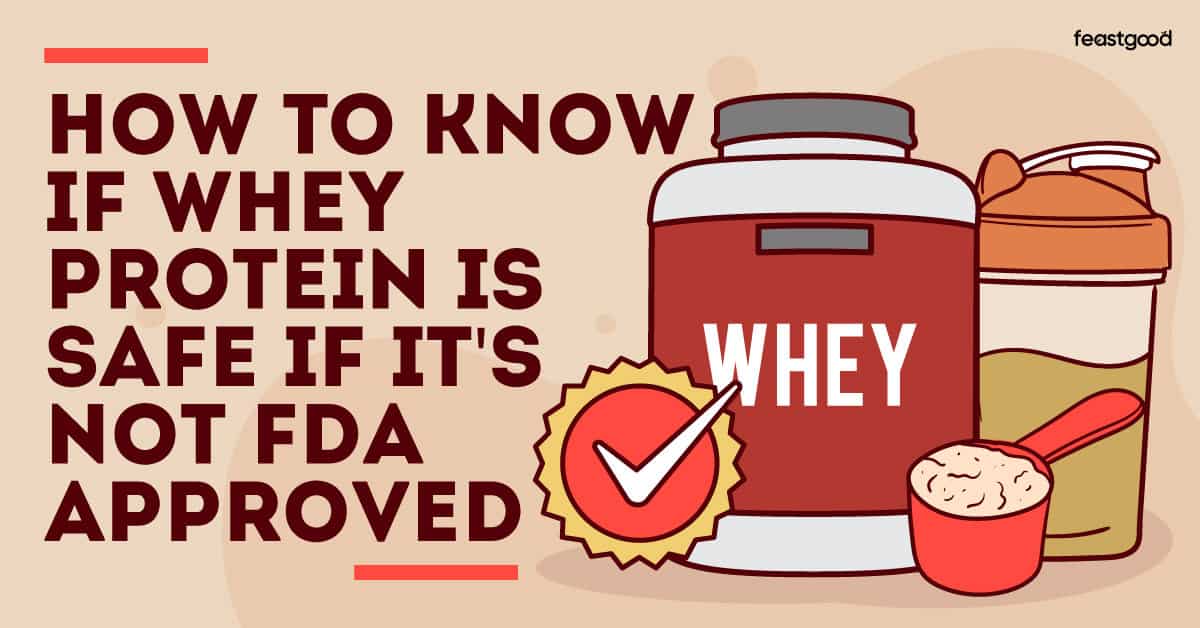Some links in this article are affiliate links, which means we earn from qualifying purchases. Learn more.
Protein powder can be a very effective tool to help you hit your protein targets, but you should do your research before choosing a protein supplement because not all protein supplements are safe to consume.
Since whey protein powder is considered a dietary supplement, they are not regulated by the Food and Drug Administration (FDA). For this reason, it’s best to choose a protein powder that has been put through third-party testing to ensure it is safe and does not contain any harmful additives or chemicals.
Many people don’t know that third-party testing exists or what it really means, so I’ll teach you how to tell if a product is third-party tested and what contaminants to watch out for.
Key Takeaways
- It is best to choose a whey protein that has been tested and certified by a reliable third-party lab like NSF, USP, Consumer Lab, Informed Choice, and Clean Label Project.
- Contaminants like heavy metals (mainly mercury, cadmium, arsenic, and lead), banned substances, pesticides, and BPA (Bisphenol A) can be present in protein powders and be harmful to your health.
- Cheaper protein powders are more likely to contain fillers, preservatives, and additives. A higher-quality whey protein that has been third-party tested will likely be more costly.
Is Protein Powder FDA Approved?
Protein powder is classified as a supplement, meaning that it is not currently regulated by the Food and Drug Administration (FDA). As a result, the FDA does not test these products for purity or safety, which means that your product might not actually contain what is listed on the label.
It is important to be aware that supplements often contain ingredients that are not listed on the product’s label. In fact, many protein supplements have been found to contain harmful contaminants such as heavy metals and even banned substances.
In most places, having your product tested for ingredient purity and label accuracy is not required, but one exception to this is protein supplements manufactured in the state of California.
It is required under Prop 65 legislation to include a warning label if the product contains substances that have been linked to ailments such as cancer, birth defects, or reproductive harm.
Therefore, all protein supplements produced in California are subject to third-party testing in order to ensure that the product is Prop 65 compliant.
This is not the norm, so it is important to know how to choose a protein powder that you can trust.
Are There Other Organizations That Test Protein Powder?
One of the best ways to determine whether a whey protein powder truly contains the ingredients that it claims to contain is to ensure it has gone through third-party testing.
Third-party lab testing is when a company will send its product to an outside lab for testing to ensure the ingredients on the label match the product and there are no unwanted or harmful substances.
There are a few different organizations that perform third-party lab testing and certification for health supplements.
The top third-party testing companies are:
1. NSF- National Sanitation Foundation
2. USP- U.S Pharmacopeia
3. Informed Choice
4. Clean Label Project
If you choose a whey protein that has been certified by one of the third-party companies listed above, then the odds of your product being safe to consume increase drastically.
For example, the Clean Label Project will test supplements for contaminants such as heavy metals, pesticide residue, and other impurities that can have a negative impact on your health. They even provide a list of the best and worst protein powders based on their criteria.
However, it’s important to note that just because a product is third-party tested doesn’t guarantee that it is free of contaminants because mistakes happen and faulty products could slip through the cracks; but choosing a product that is tested is still a much better option than one that is not.
- Related Article: What Does Organic Protein Powder Do? (Is It Worth It?)
Common Protein Powder Contaminants
Believe it or not, many health supplements on the market have been found to contain potentially harmful contaminants that are not listed anywhere on the label. This means that you could unknowingly consume ingredients that are harmful to your health.
The most common contaminants found in protein powders are:
Heavy Metals
The most common heavy metals that have been found in protein powders are mercury, cadmium, arsenic, and lead.
Since these heavy metals can be found naturally in our water and soil, many supplements on the market will contain them to some degree. However, in certain cases, these heavy metals can be present in higher quantities, which would be harmful to your health.
An accumulation of heavy metals in the body can result in symptoms such as:
- Abdominal pain
- Dehydration
- Diarrhea
- Feeling weak
- Nausea or vomiting
Banned Substances
A banned substance is a substance that has been prohibited in professional sports because it can give athletes a physical advantage over other athletes. These substances could be intentionally added, or they could occur naturally within an ingredient and unknowingly added.
Banned substances have been known to be added intentionally so that users receive better results using that particular product and continue purchasing it and recommending it to their peers.
The downside of these “enhanced benefits” is that they always come with side effects that you didn’t ask for.
For example, anabolic androgenic steroids (AAS) that mimic the male sex hormone testosterone can boost an athlete’s performance. However, regular use of this substance can lead to health issues like stroke, heart attack, and tumors, along with kidney and liver damage.
Unknowingly consuming banned substances while participating in a drug-tested sport could also cause you to be suspended from competing, even if you didn’t consume them intentionally. So it’s important to do your due diligence when it comes to choosing the right protein supplement.
Pesticides and Herbicides
Pesticides and herbicides are chemicals that are used on agricultural crops that are meant to control invasive pests and weeds. These chemicals are routinely sprayed on crops consumed by humans and livestock, but some of these chemicals have been found to be harmful to your health.
For example, glyphosate (otherwise known as Roundup) is a common herbicide that is heavily sprayed on agricultural crops and has been linked to an increased risk of cancer.
BPA
Bisphenol A is a chemical compound that is commonly found in plastic and has been shown to be an endocrine disruptor (interferes with the endocrine system in the body) which can disrupt hormones in the body.
An independent lab that tested 134 of the top-selling protein powders found that 55% of them contained measurable levels of BPA, which is not something you want in your morning smoothie.
3 Tips for Buying a Safe Protein Powder
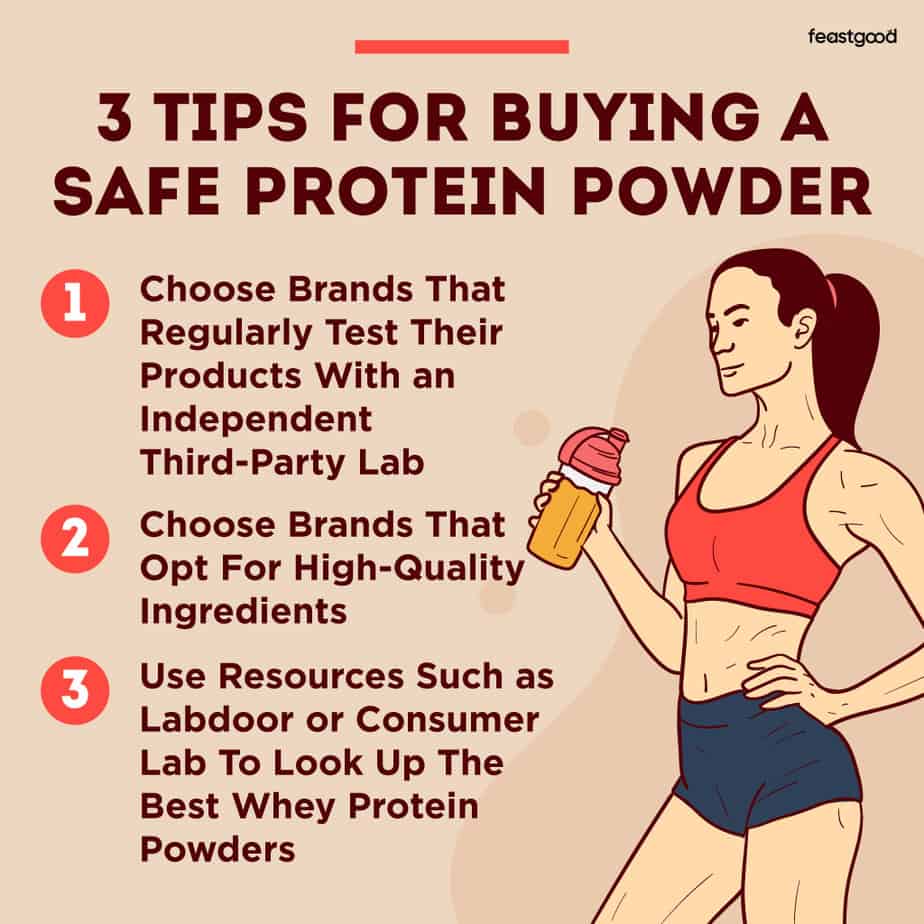
1. Choose Brands That Regularly Test Their Products With an Independent Third-Party Lab
The best way to ensure you are getting a high-quality whey protein with no harmful contaminants is to look for a certification on the label from a third-party lab such as the ones mentioned above.
This certification should be listed clearly on the front label of the product so it is easy to see because this is a major selling factor for protein powder so brands that are certified will want it to be easily visible.
For example, this particular brand of protein is NSF-certified and Informed Choice certified.
For example, this particular brand of protein is NSF-certified and Informed Choice certified.
2. Choose Brands That Opt For High-Quality Ingredients
It is best to choose brands of whey protein that use higher quality ingredients, and do not contain fillers, preservatives, dyes, and artificial sweeteners.
Choosing a protein powder brand with higher-quality ingredients can provide additional benefits to your digestion since many times ingredients like artificial preservatives, dyes, and sweeteners can cause digestive issues.
The top brands that are third-party tested and have higher-quality ingredients are:
- Transparent Labs (click to read our review)
- Naked Nutrition (click to read our review)
- PEScience (click to read our review)
- MyProtein (click to read our review)
3. Use Resources Such as Labdoor or Consumer Lab To Look Up The Best Whey Protein Powders
If you’re interested in a product that isn’t third-party tested, then you can utilize companies such as Labdoor or Consumer Lab, which review the purity of supplements on the market along with claims that might be made on the label.
These companies take it upon themselves to test the products to see whether they contain the ingredients in the quantities that they claim.
Although less trustworthy than third-party testing, it’s worth investigating if you’re choosing a product that isn’t certified.
- Related Article: Is It Bad To Drink An Expired Protein Shake? (Yes, Here’s Why)
How Much Protein Powder Should You Drink in a Day?
Technically, there is no limit to how much protein powder you can consume in a day. However, if you are concerned about ingesting potential contaminants that can be found in protein supplements then it is best to limit your consumption.
I recommend that you consume no more than 1-2 scoops per day because this will limit your exposure to any potential contaminants found in protein supplements, and it will encourage you to get more protein from whole food sources, which have more nutrients to offer.
Choosing a whey protein that is certified by a third-party lab to contain no harmful substances is a great way to ensure you are not exposing yourself to harmful amounts of these chemicals.
However, if you are still concerned about possible exposure, then it is best to avoid protein powder supplements altogether and stick with whole-food protein sources such as meat, poultry, fish, eggs, and dairy (which are just as effective, just less convenient).
Safe Protein Powder Recommendations
My top recommendations for safer whey protein powders are:
Transparent Labs Whey Protein
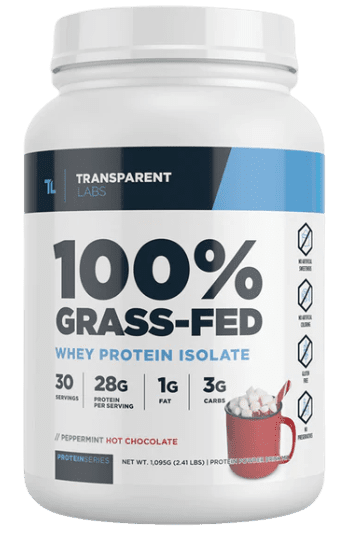
Transparent Lab’s 100% Grass-fed Whey Protein is a great option because it utilizes grass-fed whey and does not contain any artificial sweeteners, dyes, or preservatives.
Transparent Labs provides a certificate of analysis for each tub of protein, which is conducted by a third-party lab and can be viewed directly on their website.
My Protein Impact Whey Isolate
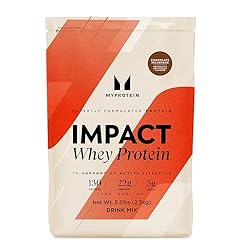
This protein powder has been certified as one of the best-quality protein powders by Labdoor and goes through thorough testing for quality and purity. This means that you can rest assured that it does not contain any harmful contaminants such as heavy metals, pesticide residue, BPA, or banned substances.
Protein Powder Brands To Avoid
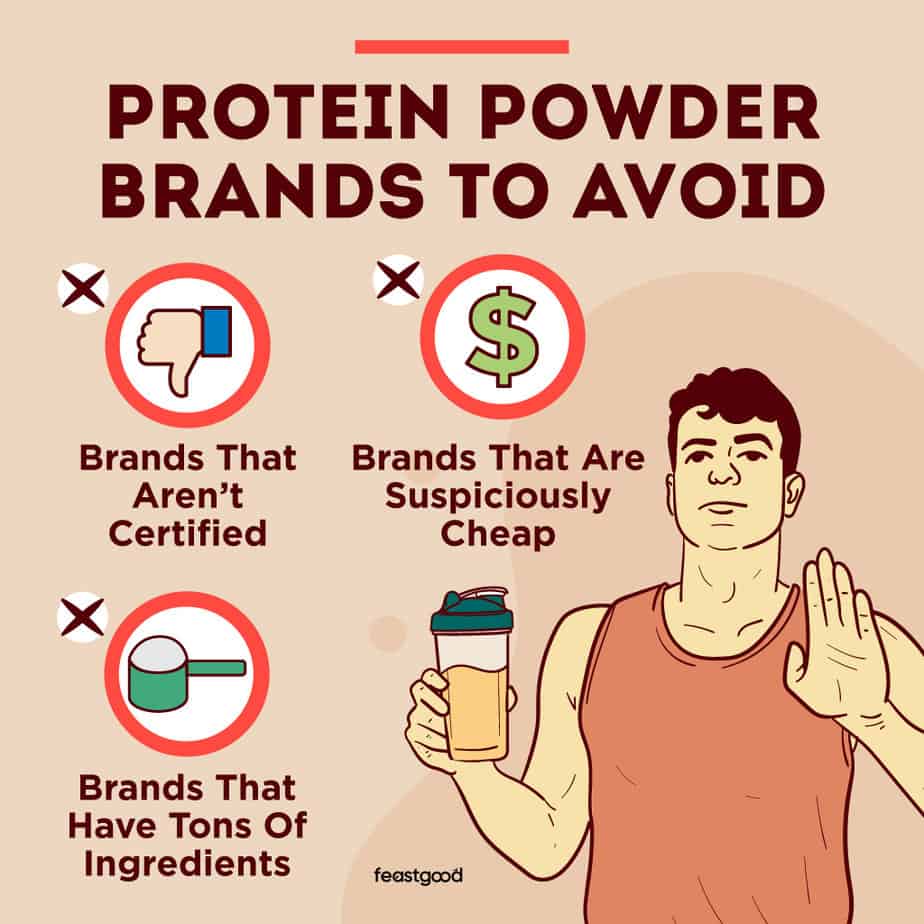
Brands That Aren’t Certified
It is a good idea to try and avoid any protein powder brands that have not been tested by a third-party lab since there is no way of truly knowing if you are consuming what you think you are without this additional testing.
In addition, if you use a whey protein that is not certified organic there is a higher likelihood that the supplement could contain contaminants such as pesticides and herbicide residue.
Brands That Are Suspiciously Cheap
One way to determine whether a company is using high-quality ingredients is by looking at the price. Unfortunately, cheaper protein powders often cut corners and use cheaper ingredients, which means you aren’t getting a high-quality protein source.
Third-party lab testing will also mean that the cost of your protein powder is going to be more expensive since this additional testing can often be costly for a supplement company.
Brands That Have Tons Of Ingredients
Finally, opting for a protein powder with minimal ingredients listed on the label (like Naked Whey) will help to ensure that you are getting the most bang for your buck and not just paying for a ton of cheap fillers that have no actual benefit.
References
Zhang, L., Rana, I., Shaffer, R. M., Taioli, E., & Sheppard, L. (2019). Exposure to glyphosate-based herbicides and risk for non-Hodgkin lymphoma: A meta-analysis and supporting evidence. Mutation Research/Reviews in Mutation Research, 781, 186-206. https://doi.org/10.1016/j.mrrev.2019.02.001
Ruiz-Ojeda, F. J., Plaza-Díaz, J., Sáez-Lara, M. J., & Gil, A. (2019). Effects of Sweeteners on the Gut Microbiota: A Review of Experimental Studies and Clinical Trials. Advances in nutrition (Bethesda, Md.), 10(suppl_1), S31–S48. https://doi.org/10.1093/advances/nmy037
About The Author

Colby Roy is a holistic health and nutrition coach. She is certified through Precision Nutrition and has a passion for all things nutrition and healing the body. More specifically, Colby likes to work with clients who want to optimize their gut health and energy levels.
Why Trust Our Content

On Staff at FeastGood.com, we have Registered Dietitians, coaches with PhDs in Human Nutrition, and internationally ranked athletes who contribute to our editorial process. This includes research, writing, editing, fact-checking, and product testing/reviews. At a bare minimum, all authors must be certified nutrition coaches by either the National Academy of Sports Medicine, International Sport Sciences Association, or Precision Nutrition. Learn more about our team here.
Have a Question?
If you have any questions or feedback about what you’ve read, you can reach out to us at [email protected]. We respond to every email within 1 business day.
